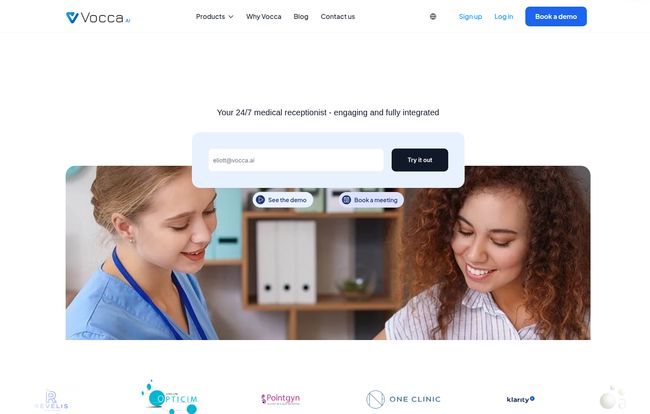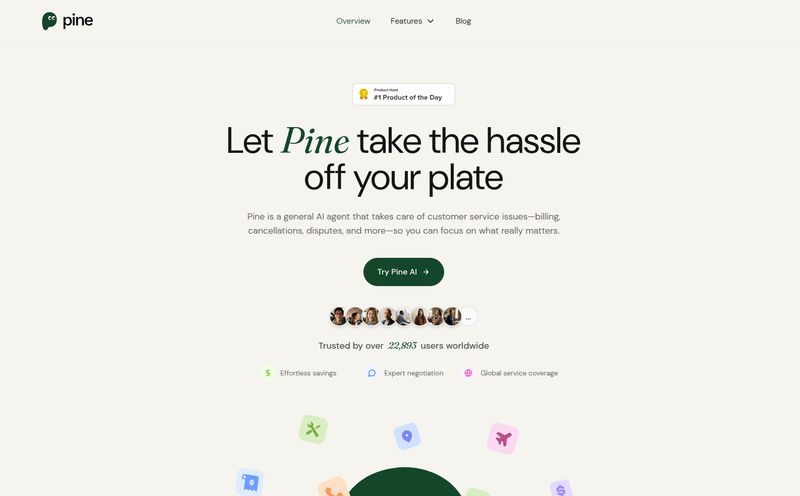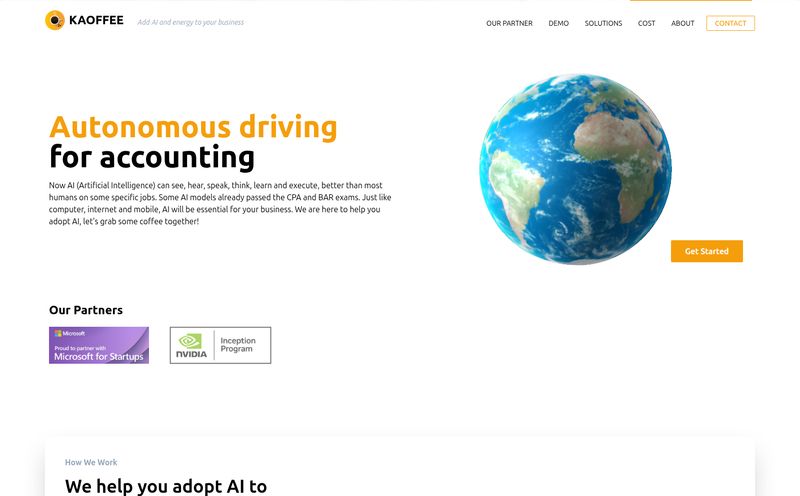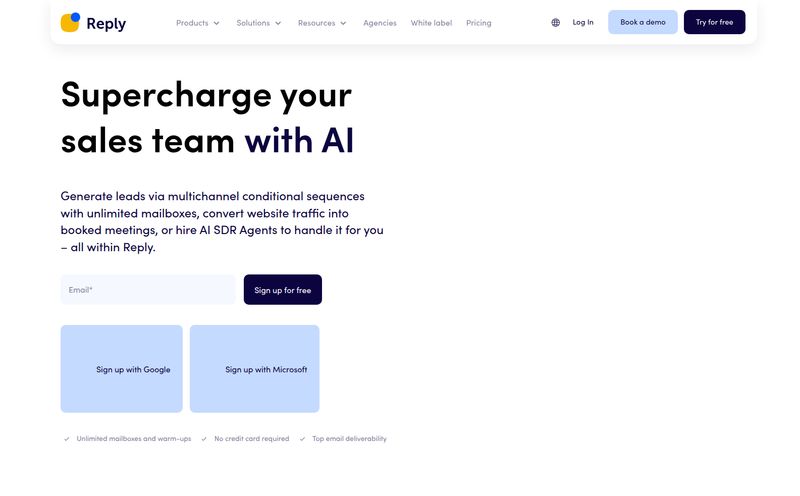Let’s paint a picture. It’s 10 AM on a Tuesday. The phone is ringing off the hook, a patient is trying to check in, another is asking for directions, and you've got a mountain of paperwork giving you the stink eye from the corner of your desk. For anyone who's ever worked at a clinic's front desk, this isn't a picture; it's a documentary. For years, the only solution was to hire more people, which isn't always feasible, or just… get faster. But what if the answer wasn't more hands, but smarter tech?
I've been watching the AI space for a long time, seeing it move from a nerdy niche to something that's changing pretty much every industry. Healthcare has always been a bit slower on the uptake, and for good reason. You can't just 'move fast and break things' when patient care is on the line. But I recently came across a tool called Vocca, and it genuinely caught my attention. It’s an AI receptionist designed specifically for clinics, and it claims to be the 24/7, engaging, and integrated solution to front desk chaos.
So, is it just another shiny tech object, or could it actually be the virtual team member your practice has been dreaming of? Let's get into it.

Visit Vocca
So What Exactly is Vocca?
On the surface, Vocca is an AI that answers your clinic’s phone. Simple, right? But it's a bit more nuanced than that. Think of it less like a robotic voicemail system and more like a hyper-efficient, caffeine-fueled intern who never sleeps, never calls in sick, and never gets flustered. Its entire purpose is to handle the autonomous, repetitive communication tasks that bog down a medical practice.
It’s designed to answer patient calls instantly—no more endless ringing or frustrating hold music. It can book appointments, answer common questions (like "what are your hours?"), and even make outbound calls for things like appointment reminders. The goal is to free up your human staff to focus on the things that require a human touch: in-person patient care, complex billing questions, and providing that reassuring smile that an AI, no matter how smart, just can't replicate. At least not yet.
The Core Features That Actually Make a Difference
A feature list is just a list until you see how it applies to your real-world problems. I've seen countless platforms with a million features where you only end up using two. Vocca seems to have a pretty focused approach, which I appreciate.
Your 24/7 Front Desk Hero
The most obvious win here is the 24/7 availability. Patients don't just have questions or the urge to book an appointment between 9 and 5. With Vocca, if someone remembers they need to book a check-up at 10 PM while watching Netflix, they can call and get it sorted. This instantly expands your practice's accessibility and, let's be honest, probably captures appointments you might have otherwise missed.
Smart Appointment Booking and System Integration
This is the bread and butter. Vocca doesn't just take a message; it integrates directly with your existing calendar and CRM systems. This is huge. It means the AI can see real-time availability and book a patient into an open slot without you having to manually transfer the information. This reduces the chance of double-bookings and other human errors that happen when things get hectic. A tool that doesn't play nice with your current software is a non-starter for most clinics, so this integration capability is a big check in the 'pro' column.
Going Beyond Simple Call Answering
Here’s where it gets a little more interesting. Vocca also manages tasks and logs complex queries. If a patient calls with a question the AI can't answer, it doesn't just hang up. It’s designed to understand the query, log it as a task for a human staff member to review, and can even transcribe the call. That call transcription and tagging feature is a sneaky-good tool for quality control and training. You get a clear record of patient interactions, which can be invaluable for understanding common issues or concerns.
The Real-World Impact on a Clinic
Okay, features are cool, but what about results? The whole point of bringing in a tool like this is to improve things. Based on their own case studies and just a general understanding of workflow automation, the benefits seem to fall into two main camps.
First, happier patients and a less stressed team. Long wait times are a major source of patient frustration. Eliminating them is a massive customer service win. As Dr. Ines Perea noted, Vocca "efficiently handles a large volume of calls, allowing my team to concentrate on patient care." This is the dream, isn't it? Letting technology handle the grunt work so your talented staff can do what they do best. Dr. Alex Simons from Kineaz called it an "amazing tool that has helped us a lot," which, while simple, speaks volumes.
"I'm very impressed by this solution. It efficiently handles a large volume of calls, allowing my team to concentrate on patient care and other tasks." - Dr. Ines Perea, Privilège
Second, a healthier bottom line. Fewer missed calls means more booked appointments. Automating outbound reminders reduces no-shows. And optimizing your reception staff's time means you're running a more efficient operation. While it's a tool with a cost, the idea is that the return on investment comes from increased bookings and reduced operational drag.
Let's Be Real: The Potential Sticking Points
Now, I've been around the block enough to know there's no such thing as a perfect solution. Every new implementation has its hurdles. Based on my experience with similar AI tools, there are a few things to keep in mind with Vocca.
First, there's the setup. Integrating any new software with your existing calendar and CRM takes some initial effort. It’s not plug-and-play, and you'll want to dedicate some time to get it configured correctly.
Second, the AI is only as good as its programming. While it's built to understand patient needs, there will inevitably be a learning curve. A patient with a thick accent, a complex multi-part question, or just an unusual request might stump the AI. This can lead to frustration if not handled gracefully (which is why the task-logging feature for human follow-up is so important).
It’s a classic case of managing expectations. This tool won't replace your amazing receptionist, but it can make their job a whole lot easier.
The Big Question: What's the Price Tag?
Ah, the part everyone scrolls down for. I scoured the Vocca website, but like many specialized B2B SaaS platforms, they don't list their pricing publicly. You'll see a "Book a demo" button instead of a pricing page.
This is pretty standard for this type of service. Pricing likely depends on the size of your practice, your call volume, and the specific integrations you need. My advice? Don't let the lack of a price tag scare you off. A demo is a good opportunity to ask tough questions and see if the value proposition makes sense for your specific budget and needs.
FAQs about Vocca AI
What happens if Vocca can't handle a patient's request?
This is probably the biggest concern. Vocca is designed to recognize when a query is too complex for it to handle. In these cases, it doesn't just give up. It logs the patient's request, transcribes the conversation, and creates a task for a human staff member to follow up on, ensuring no patient query falls through the cracks.
How does it integrate with my clinic's software?
Vocca is built to connect with common calendar and CRM (Customer Relationship Management) systems used by clinics. The specifics of the integration would be covered during the demo process to ensure it works with your specific tech stack.
Is patient data kept secure and private?
Given that Vocca operates in the healthcare space (with offices in the EU and US), they are certainly aware of regulations like HIPAA and GDPR. Data security is a top priority for any tool handling patient information. You should absolutely confirm their specific compliance standards during a demo.
Can the AI handle different languages or accents?
With offices in Paris and Austin, it's highly likely the system is designed to handle at least French and English. The system's effectiveness with various accents is a key performance indicator for any voice AI. This would be another excellent question to bring to a demo—perhaps even test it if possible.
Does it just handle incoming calls?
No, it's a two-way street. Vocca can also make automated outbound calls, which is perfect for things like appointment reminders, which helps to reduce patient no-shows.
So, Is Vocca the Future for Your Front Desk?
I started this a bit skeptical, as I always am with claims of AI revolutionizing, well, anything. But I'm walking away genuinely optimistic about Vocca. It’s not trying to be a sci-fi robot doctor. It’s a focused, practical tool aimed at solving one of the most persistent and annoying problems in practice management: the relentless phone.
If your clinic is drowning in calls, if your staff is burned out from multitasking, or if you're simply looking for a smart way to modernize and improve patient access, then Vocca is definitely worth investigating. It represents a shift from just managing the daily chaos to actively automating it, freeing your team to focus on what truly matters: the people in front of them.
It’s not magic, but it’s smart. And in today's world, that might be even better.
Reference and Sources
- The official Vocca website and platform information: https://vocca.ai



